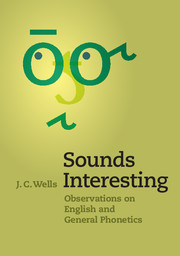3 - Teaching and examining
Teaching and examining phonetics, including general phonetics and EFL
Published online by Cambridge University Press: 05 October 2014
Summary
deceptive strings
In some phonetics oral exams we test the candidates on reading aloud short strings of phonetic symbols. Some of these are real English words – dɪˈnaɪ, ˈpɜːpəs and the like. Others look like English but are not, since they are not spellings but phonetic symbols, e.g. ˈreply, in which the last vowel is to be interpreted IPA-style as a close front rounded vowel; or thumb, where we need [t] followed by [h], a close back vowel, [m] and a final [b]. Candidates find these sequences remarkably difficult to perform correctly.
practical tests
The practical test we used to give our MA Phonetics students at UCL covered transcription, dictation and the oral component (performance and recognition).
The transcription passage was a colloquial dialogue to be phonetically transcribed and marked up for intonation. Here is a sample passage.
A Oh, hi there! I was wondering if I could have a word with you.
B Yes, of course. What is it?
A It’s about that Birmingham job I mentioned. I’ve finally decided to go ahead and apply for it.
B Well, good luck then. But what d’you want me to do about it?
A I was hoping you might give me a reference, or at least put in a good word for me.
B OK. You’ll have to tell me what you want me to say, though. I’m not very well informed about your career to date, you know.
A Oh, I’ll cover all that in my c.v. What I need from you is more a character reference, saying that I’m trustworthy and honest and so on.
B All right, then. Give my name to the recruitment agency and get them to write to me. I hope you get the job, though of course I’ll be sad to see you go.
- Type
- Chapter
- Information
- Sounds InterestingObservations on English and General Phonetics, pp. 82 - 102Publisher: Cambridge University PressPrint publication year: 2014



